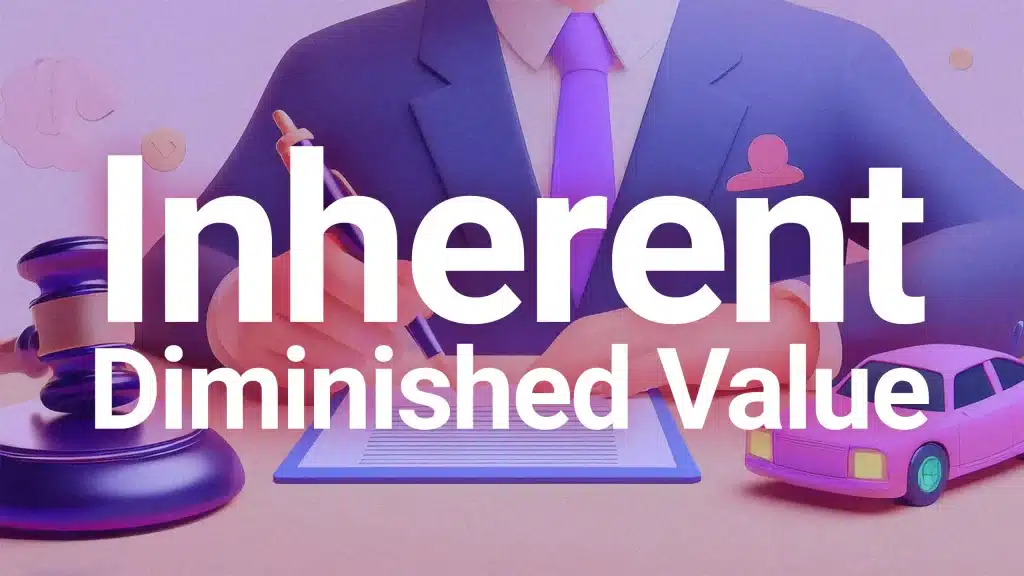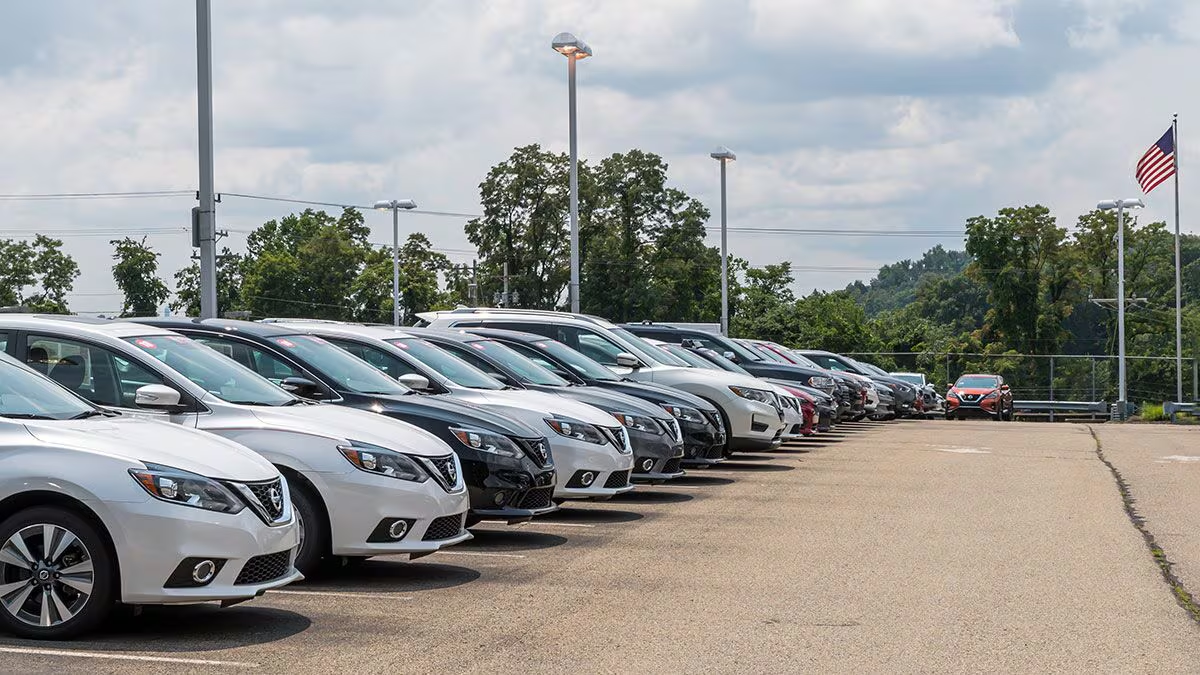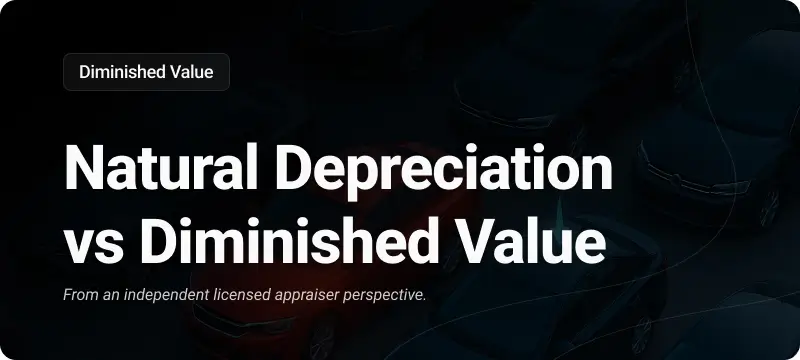Have you ever wondered why your car’s value drops after an accident, even after it is repaired? This is where the concept of “inherent diminished value” comes into play.
It’s a term that describes the permanent loss of value a vehicle suffers after an accident. No matter how good the repairs are.
Let’s explore what inherent diminished value really means. Why it’s inevitable and how it can affect your vehicle’s resale value.
DOWNLOAD THIS ARTICLE: Inherent Diminished Value

What Is Inherent Diminished Value?
Inherent diminished value refers to the built-in reduction in a vehicle’s worth after it’s been in an accident, regardless of how well it was repaired.
It’s not about the car’s physical condition after repairs. It is about how future buyers perceive the car because it now has a permanent damage record. This devaluation is automatic and stems from the stigma of a damaged vehicle, making it hard to sell at full price.
→ Learn more: Do I Qualify for Diminished Value?
To be clear, let’s imagine this scenario:
There are two identical 2022 Honda Accords that you’re looking for. But there’s a catch: one of them was in an accident. You’ve taken a good look at the repaired one, and it seems as good as the other. But you’re not 100% sure of paying the same; it simply doesn’t seem fair. So you do what everyone in your shoes would… You ask for a lower price.
That is precisely the process that generates the inherent diminished value.
The average diminished value amount is $6,200. We can help you get what you deserve.
How to Know If a Car Has an Inherent Diminished Value
When a car gets into an accident, especially a serious one, that event becomes a permanent part of its history, thanks to Carfax reports and other vehicle history databases. Buyers have access to this information, and many will choose to pay less for a car with a recorded accident, even if it has been restored to factory condition.
Can Repairs Erase Inherent Diminished Value?
Again, no, it can’t. “Inherent” in “inherent diminished value” refers exactly to this point. It is about the intrinsic loss of value tied to the vehicle after it got in an accident.
The idea is: “This car was in an accident”. And that’s it. This loss is not more about the property but how it is perceived. When cars get into accidents, people see them as less valuable. It’s similar to buying a product with a “used” label—no matter how great it looks, you still know it’s been through something before, and that affects your willingness to pay full price.
Any Diminished Value is Inherent?
Not exactly. While inherent diminished value is a type of diminished value, not all forms of diminished value are considered “inherent.”
Repair-Related Diminished Value isn’t inherent, because it’s linked to the quality of repairs. If repairs are done poorly or with non-original parts, the vehicle loses more value. This is conditional based on the workmanship of the repairs.
Immediate Diminished Value also isn’t inherent. It refers to the value drop before repairs, when the car is still damaged. Once the vehicle is repaired, this particular value loss no longer exists. It’s based on the condition of the vehicle in its damaged state, not its long-term market perception.
How Much Value Does a Vehicle Lose After an Accident?
The amount of value a vehicle loses due to inherent diminished value varies depending on several factors:
- Severity of the Accident: A minor fender-bender may result in only a small reduction in value, while a major collision could result in a significant drop.
- Type of Vehicle: Luxury cars and high-end models tend to lose more value after an accident than lower-priced vehicles because buyers expect them to be in pristine condition.
- Age and Mileage: Newer vehicles with lower mileage generally suffer a greater loss in value than older, higher-mileage vehicles because buyers place more importance on a clean history in newer cars.
GET MORE MONEY FROM THE INSURER
Don’t leave money on the table! Order a FREE Claim Review and discover your car’s true value.
Protecting Yourself Against Inherent Diminished Value
If you’re involved in an accident, you may be able to claim inherent diminished value from the at-fault driver’s insurance company. Many insurers will cover the inherent diminished value of your vehicle as part of a settlement, but you’ll need to provide proof, often in the form of an appraisal that shows how much the vehicle’s value has decreased due to the accident.
→ Learn more: How to File a Diminished Value Claim After a Car Accident?
Here are some steps you can take:
- Get a Professional Appraisal
After your car has been repaired, it’s a good idea to get an appraisal that estimates the current market value, including any diminished value due to the accident.
- Keep Detailed Records
Maintain all records of repairs and appraisals. Having these on hand will help you make a stronger case when negotiating with insurance companies.
Not sure if the insurance offer is fair? Get a Free Claim review from our experts!

Final Thoughts: The Lasting Impact of Diminished Value
Inherent diminished value is a reality that can’t be avoided once a car has been in an accident. While quality repairs are important to maintain the car’s functionality and safety, they won’t completely restore its market value. Buyers are likely to view the car’s accident history as a red flag, leading to a lower resale price.
Understanding inherent diminished value can help you better navigate the post-accident world, whether you’re dealing with insurance companies or preparing to sell your vehicle down the line. While you can’t completely escape the impact of inherent diminished value, knowing your options—like pursuing compensation from an insurance company—can help mitigate the financial loss.
Are you planning to buy a car soon? How important is a clean accident history to you?



